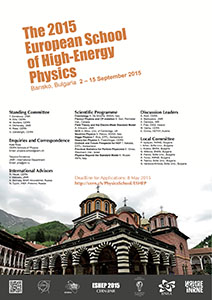2015 European School of High-Energy Physics
 The 2015 European School of High-Energy Physics (formerly the CERN–JINR School of Physics) will take place from 2 to 15 September 2015 in Bansko, Bulgaria. It is organised and sponsored by CERN and the Joint Institute for Nuclear Research (JINR), Dubna, Russia, together with the University of Sofia, the Bulgarian Nuclear Regulatory Agency (BNRA), and the Institute for Nuclear Research and Nuclear Energy (INRNE) in Bulgaria.
The 2015 European School of High-Energy Physics (formerly the CERN–JINR School of Physics) will take place from 2 to 15 September 2015 in Bansko, Bulgaria. It is organised and sponsored by CERN and the Joint Institute for Nuclear Research (JINR), Dubna, Russia, together with the University of Sofia, the Bulgarian Nuclear Regulatory Agency (BNRA), and the Institute for Nuclear Research and Nuclear Energy (INRNE) in Bulgaria.
The School is intended for junior researchers, mainly doctoral students in the final years of work towards their PhDs, who specialise in experimental HEP and have at least one year of experience as experimentalists or phenomenologists. Approximately one hundred participants, mainly from CERN and JINR Member States, will be selected to attend the School this year. They will have the opportunity to focus on the latest research topics, discuss their work and exchange ideas with colleagues, and learn about the new developments in the field.
The current version of the School began in 1993. However, the CERN Schools of High-Energy Physics were first organised in the early 1960s and, since the beginning of the 1970s, were held in collaboration with JINR, CERN's sister organisation in the former Soviet Union. More than forty years later, this successful partnership still continues, bringing together young researchers from different nations around Europe to collaborate in harmony for two busy weeks. Besides preparing the participants for research in experimental HEP, the School also aims to promote cultural exchange and informal interaction among everyone involved. Hence, students of different nationalities, cultural background, and language work together, united by a common interest in science and the desire to expand human knowledge.
The organisers have prepared a rich and varied scientific programme, which includes 33 lectures, each lasting about 75 minutes, with additional time for questions and discussion. The lectures will cover a wide range of topics, namely cosmology, flavour physics and CP violation, field theory and the electro-weak Standard Model, QCD, neutrino physics, Higgs physics, heavy-ion physics, outlook and future prospects for HEP, practical statistics for particle physicists, and physics beyond the Standard Model. In addition, discussion sessions will be held most afternoons after the lectures. The participants will be divided in groups and carry out a collaborative project that will be presented by a group representative at a dedicated session. S. Alioli (CERN), A. Bednyakov (JINR), S. Demidov (INR), V. Filev (DIAS, Ireland), M. Garny (CERN), and E. Ginina (HEPHY, Austria) have been appointed discussion leaders. Finally, a poster session will be organised during the first week of the School, giving students the opportunity to discuss their work and ideas with leading scientists in the field, as well as develop their communication and collaboration skills in a context very relevant to their future work as practising researchers.
